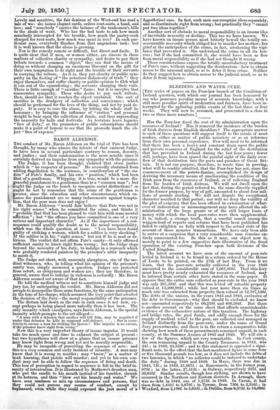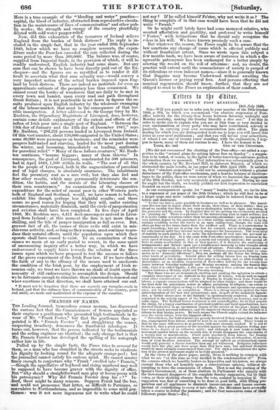BLEEDING AND WATER CURE.
[TEE series of papers on the Poor-law branch of the Condition-of- Ireland question, with which our journal has been honoured by one who possesses peculiar means of accurate knowledge, with a still more peculiar spirit of moderation and fairness' have been in- terrupted by the agitating public events of the last three or four weeks. They will now be resumed, and prosecuted to a close in two or three more numbers.] Has the Poor-law fixed the cost of its administration upon the resources of Ireland ? Has it removed the incidence of the burden of Irish distress from English shoulders ? The appropriate answer to each of these questions will suggest itself to the minds of most readers, either as matter of public notoriety or as an inference from their own personal experience. Few will need to be informed that there has been a heavy and constant drain upon the public and private resources of England for the relief of the destitution that has prevailed in Ireland during the last four years ; fewer still, perhaps' have been spared the painful sight of the daily over- flow of that destitution into the ports and parishes of Great Bri- tain. It is not our purpose, therefore, to waste time in proving, what will be readily admitted, that the Poor-law has not, since the commencement of the potato-famine, accomplished its design of deriving the necessary means of ameliorating the condition of the Irish poor from the resources of Ireland, or of relieving England from the burden of Irish distress. We will not dwell upon the fact that, during the period referred to, the sums directly supplied for the former purpose, by way of gift, amounted to about four mil- lions of pounds sterling. We will not dispute the exceptional character ascribed to that period ; nor will we deny the validity of the plea of exigency that has been offered in extenuation of what, ever of indiscretion or mismanagement may have affected the ad- ministration of the large grants or of the still larger loans of money .with which the local poor-rates were then supplemented. It is, indeed, a strange truth that a careful search among the waggon-load of reports and returns that have been published has failed to enlighten us fully with respect to the actual state of the account of those monster transactions. We have only been able to arrive at a suspicion that a very considerable sum remains en- tirely unaccounted for. Be this as it may, our object now is, merely to point to a few suggestive fads illustrative of the fiscal operation of the existing Poor-law upon both divisions of the United Kingdom.
The latest account we have seen of the amount of poor-rate levied in Ireland is to be found in a return ordered by the House of Lords to be printed, on the 27th of last May. From it we learn, that the poor-rate actually collected in the year 1849 amounted to the considerable sum of 1,661,803/. That this levy must have pretty nearly exhausted the resources of Ireland, may be inferred from certain other facts stated in the same paper. It appears that the entire sum collected as poor-rate in the year 1843 was only 267,592/. and that this was levied off rateable property valued at 13,300,9821.; while last year more than six times as much rate was extracted from property then valued at 12,707,1261. The debts of the unions in the years 1843 and 1849, exclusive of
Government—why debt to GovernmenI—why that should be excluded we know not—amounted respectively to 60,219/. and 460,3841. But there is another account on the same sheet that affords unmistakeable evidence of the exhaustive nature of this taxation. The highway and bridge rates the gaol funds, and oddly enough those for the supply of medical relief to the poor, are collected and managed in Ireland distinctly from the poor-rate, under the name of Grand Jury presentments; and there is in the return a comparative table showing how much of these presentments remained unpaid, in each county, at the Summer Assizes of 1843 and 1849. We will cite a
few of the figures, -which are very remarkable. In Cork county, the sum remaining unpaid to the County Treasurer, in 1843, was 541. • in 1849, 24,3591.; and to this statement is appended a signi- ficant note, to the effect that the last-mentioned figure is some four or five thousand pounds too low, as it does not include the debts of two baronies, in which "no collector could be induced to undertake the duty" during 1848 and 1849. In Mayo, there was due in
1843, 751.; in 1849, 21,9671.: in Roscommon, in the former year,
9791.; ; in the latter, 27,5131.: in Galway,. respectively 2371. and 30 Similar results, though less eh-ling, are shown to have occurred in the Northern and Eastern districts. In Armagh, there was no debt in 1843, one of 1,2731. in 1849. In Cavan, it had risen from 1,451/. to 3,6701.; in Tyrone, from 7501. to 2,3161. • in Wexford, from 2,1901. to 5,6651.; in Dublin, from 9,3731. to 18,0961. Here is a true example of the "bleeding and water" practice— capital, the bleed of industry, abstracted from reproductive circula- tion in the maintenance of lines of communication* and other pub lieworks ; the strength and energy of the country plentifully diluted with cold water pauper-relief.
Now, did this exhaustion of the resources of Ireland relieve Fmgland from the burden of Irish distress ? The reply is in- cluded in the dmple fact, that in the year ended -29th September 1849, below which we have no complete accounts, the expen- diture under the Poor-law exceeded the rate collected during the same period by more than 500,000/. The balance was, of course, supplied from Imperial funds, in the provision of which, it will be radilv understood, English industry had some share. But any sum that can be shown to have been directly paid out of the Ex- chequer—and the figures are so mystified as to render it dif- ficult to ascertain what that sum actually -was—would convey a very imperfect notion of the actual burden imposed upon Eng- land by Irish distress. There are indeed no materials for even an approximate estimate of the pecuniary loss thus occasioned. We cannot count the hordes of wanderers that are daily to be met in every town and hamlet, upon every road and path throughout Great Britain ; it is not practicable to set down in figures the in- sults produced upon English industry by the wholesale swamping of the labour-market, that must be the consequence of that ter- rible immigration. A letter addressed to Sir George Grey by Mr. Rushton, the Stipendiary Magistrate of Liverpool, does, however, contain some details explanatory of the extent and effects of the influx of Irish poor into a single port of England. "Between the 13th day of January and the 13th day of December 1847," says Mr. Rushton, "296,231 persons landed in Liverpool from Ireland. Of this vast number, about 130,000 emigrated to the United States; some 50,000 were passengers on business ; and the remainder were paupers half-naked and starving, landed for the most part during the winter, and becoming, immediately on landing, applicants for parochial relief." "Many of these forlorn creatures," Mr. Rush- ton continues, "became beggars; many of them thieves." In consequence, the gaol of Liverpool, constructed for 500 prisoners, bad in April 1849, 1,100 within its walls. "The cost of all this to the people of Liverpool, both in the augmentation of parochial and of legal charges, is absolutely enormous. The inhabitants feel the pecuniary cost as a sore evil; but they also feel and fear other results, which may permanently deteriorate the con- dition, the habits, and the morals of the labouring classes of their own countrymen." An examination of the comparative expenditure for the relief of casual poor in other Western ports both of England and Scotland, would, we have reason to believe, exhibit like though perhaps less frightful results; and there seems no good reason for hoping that they will, under existing circumstances' materially diminish, until the circle of pauperization and eviction shall have been completed. In five days of April 1849, Mr. Rushton says, 4,412 deck-passengers arrived in Liver- pool from Ireland : at this moment the fare is not more than a stilling, and the tide of pauper immigration as full as ever. But, gravest fact of all, the causes of these evils still exist in mis- chievous activity, and, so long as they remain, must continue to pro- duoe their natural effects, until the population upon which they operate shall have ceased to exist. To an examination of these causes we mean at an early period to revert, in the same spirit of uncensuring inquiry after a better way, in which we have endeavoured to supply hints towards the solution of the three issues upon which we have proposed to test the success or failure of the grave experiment of the Irish Poor-law. If we have shaken the faith of any in the efficacy of the means used to ameliorate the condition of the Irish poor' by the employment of Irish re- sources only., we trust we have thrown no shade of doubt upon the necessity of still endeavouring to accomplish the design. Should we be fortunate enough to stimulate those concerned to renewed and wiser exertions in that direction, we shall have attained our end.
• It must not be forgotten that there are scarcely any turnpike-roads in Ireland, and that the ordinary lines of communication of the country, great and small, are made and maintained at the expense of the counties.



























 Previous page
Previous page